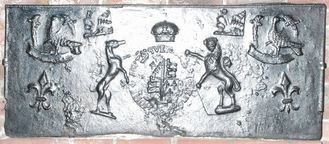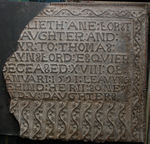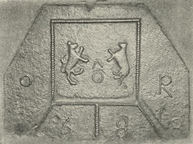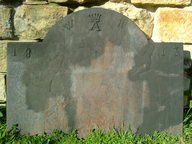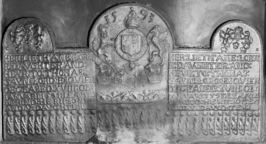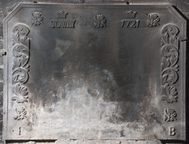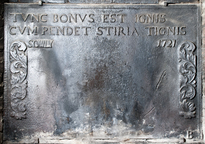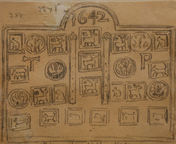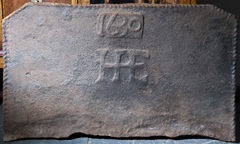-
10
Description: Rectangular; rope edging (top and sides); central Tudor royal shield with encircling garter (motto reversed: HONE SOVT QVEY … PEN), separate greyhound and lion supporters, separate crown; a bird, repeated in each top corner, its wings displayed and inverted and its head facing behind and to the left, standing on a scroll; a fleur de lys repeated in the bottom corners; inside the birds is a repeated stamp, half of one similar to a stamp on a fireback in Hastings Museum.
Notes: The particular form of the Tudor arms and supporters is encountered on other firebacks, as are the distinctive style of fleurs de lys and the birds (probably swans, a Lancastrian icon). The plain scroll upon which the bird is perched suggests that there might have been a painted inscription on it originally and that the stamp had not been made specifically for the decoration of firebacks but was, perhaps, redundant from interior domestic decoration. Formerly at Framfield, East Sussex.
Arms: Tudor royal (prob. Elizabeth I)
- Decoration tags:
- rectangular (shape)
- rope (edging)
- carved stamps
- heraldic
- armorial
- royal
- objects
Manufactured: in the mid- to late-16th century possibly at Pounsley Furnace, Framfield in the Weald area of England.
Current location: The Clergy House, Alfriston, East Sussex, England.
Museum number: 200044 (part of the National Trust museum group)
-
12
Description: Rectangular; twisted rope edging on top and sides; inscription panel with repeated trailing vine decoration from impressed wooden strips — one horizontal line at top, one vertical strip on right side (missing but probably repeated on left), at least ten short vertical strips below inscription.
Notes: Formerly at Fulling Mill Cottages, and possibly formerly at Wakehurst Place, Ardingly; it was moved to Ardingly church sometime after 1915. The inscription panel is identical to that on the memorial plate to Anne Forster in Crowhurst church, Surrey; at least ten other firebacks are known with the same inscription panel. Edward Culpeper (1561-1630), of Wakehurst, was fourth cousin, once removed, of Anne Forster. Assuming the vine strip and rope edging on the left side were of approximately the same width as on the right the overall original width of the fireback is estimated to have been 837mm.
Inscription: HER : LIETH : ANE : FORST/ R : DAVGHTER : AND : / HEYR : TO : THOMAS : / GAYNSFORD : ESQVIER / DECEASED : XVIII : OF: / IANVARI : 1591 : LEAVYNG / BEHIND : HER II : SONES : / AND : V : DAVGHTERS
- Decoration tags:
- rectangular (shape)
- rope (edging)
- carved stamps
- carved pattern panels
- planklines
- text
- plants
Manufactured: in the late-16th century possibly at Pounsley Furnace, Framfield in the Weald area of England.
Current location: St Peter's Church, Church Lane, Ardingly, West Sussex, England.
Citation: Holgate, M. S., n.d., The Parish Church of St Peter, Ardingly: Historical and Architectural Notes.
-
897
Description: Steeply canted rectangle; no edging; upper centre, square formed of twisted rope lengths inside which are what appear to be two lions passant in pale with a circle and two short sloping lines in inverted V form above; on either side of the square is an O and an R; below the square three lengths of twisted rope extend to the bottom edge, the central one vertically and the the outer two sloping away from the centre; along the bottom is the date, each numeral separated by one of the rope lengths.
Notes: Alleged to be a representation of the arms of the O'Rourke family, who held sway in Cavan and Leitrim, the initials said to be of Owen O'Rourke. Noted in a cottage at Arigna, County Roscommon.
Inscription: O O R / 1 6 8 8
Arms: O'Rourke
- Decoration tags:
- rectangular with canted top corners (shape)
- none (edging)
- simple stamps
- carved stamps
- heraldic
- text
- animals
- objects
Manufactured: in 1688 possibly at Drumshanbo Furnace in the Leitrim area of Ireland.
Current location: not known.
Citation: Lindsay, J. S., 1927, Iron & Brass Implements of the English House (London, The Medici Society).
- Attached to series:
- Miscellaneous stamp firebacks
-
14
Description: Arched rectangular shape; plain plate. Crowned capital ‘A’ between ‘W’ and ‘R’; divided date at top extremities of plate; single six-pointed star below ‘A’.
Notes: Earl’s coronet denotes the Earl of Ashburnham, furnace owner; ‘WR’ denotes William Rummins, furnace founder; 1813 - the furnace was blown out for the last time in late February 1813. Similar to, but narrower than the fireback at Church Farm, Penhurst (in private hands), and uses the same cipher and numbers. One of a small series of firebacks cast in the early-19th century for farms on the Ashburnham estate; this example was formerly at Great Sprays Farm, Penhurst.
Inscription: W A R / 18 * 13
- Decoration tags:
- rectangular with round arch (shape)
- none (edging)
- carved stamps
- individual letters
- individual numbers
- heraldic
- text
- objects
Manufactured: in 1813 at Ashburnham Furnace in the Weald area of England.
Current location: in private hands, Ashburnham, East Sussex, England.
- Attached to series:
- Ashburnham late series
-
200
Description: Composite; rectangular with semi-circular arches in middle (large) and ends (small) of top edge; rope on all edges except bottom; central panel effectively comprises an arched fireback form with Tudor royal arms (temp. Elizabeth I) with date above, and, below, letters G M, made from rope with fleur de lys terminals between two coronets surmounted by lions; below this are fronds with roses. On either side of this panel are placed the Anne Forster inscription panels; above each of these is a rose and crown with lion and dragon supporters, beneath which are three fleurs de lys. Along the base of the inscription panels and the central panel are single rows of ‘grape bunch’ shapes, beneath which are repeated trailing vine decoration from impressed wooden strips across the entire width of the fireback; 35 in all.
Notes: Formerly at Baynard's Park, Ewhurst, Surrey; GM probably refers to Sir George More, who built Baynards Park after buying the estate in 1587, and who moved to Loseley in 1604. The central coat of arms has been noted on two other firebacks, dated 1588 (no. 41) and 1595 (no. 482). The rose and crown stamps have been noted on a fireback in Haslemere Museum, and on examples illustrated by Lower (all of which bear the date 1582 and the initials IA; e.g. no. 107 or no. 472). The association of these stamps and the particular form of rope lettering, with the Anne Forster inscription and the ‘grape bunch’ shapes, both of which have been linked with other stamps from Pounsley furnace, suggests that they, too, were part of the stock of those works.
Inscription: 15 93 / GM / HER : LIETH : ANE : FORST/ R : DAVGHTER : AND : / HEYR : TO : THOMAS : / GAYNSFORD : ESQVIER / DECEASED : XVIII : OF: / IANVARI : 1591 : LEAVYNG / BEHIND : HER II : SONES : / AND : V : DAVGHTERS [twice]
Arms: Tudor royal
- Decoration tags:
- rectangular with three arches (shape)
- rope (edging)
- simple stamps
- carved stamps
- carved pattern panels
- individual letters
- individual numbers
- planklines
- heraldic
- armorial
- royal
- text
Manufactured: in 1593 possibly at Pounsley Furnace, Framfield in the Weald area of England.
Current location: not known.
Citation: Manning, O. & Bray, W., 1809, History of Surrey Vol. II (London, John White), p. 369n.
Citation: Ogilvy, J. S., 1914, A Pilgrimage in Surrey, vol. 2 (London, G. Routledge & Sons), p. 8.
-
201
Description: Rectangular; moulded fillet edging on top and sides; TCI, also arranged symmetrically, in a widely spaced triad; below, symmetrical layout of central rose and crown between two concentric roundels, with two fleurs-de-lys outside.
Notes: The style of rose and crown is similar to that used in gun founding in the Tudor period, suggesting that the furnace that was the source of this fireback may have been previously used for that purpose. Formerly at Baynards Park, Cranleigh, Surrey.
Inscription: 16 T C I [triad] 70
- Decoration tags:
- rectangular (shape)
- complex, furniture-derived (edging)
- carved stamps
- individual letters
- individual numbers
- heraldic
- royal
- text
Manufactured: in 1670 in the Weald area of England.
Current location: not known.
- Attached to series:
- 1660s-90s Wealden series
-
1056
Description: Canted rectangle; moulded fillet edging (top and sides); top line, 'daisy' plant stamp repeated three times, spaced evenly, with 'SOWLY' in a block, a ducal coronet above, between the left two, and '1721' in individual numerals, a ducal coronet above, between the right two; a swirling foliage stamp repeated down each side, a 'daisy' plant below each; initials 'I' and 'B' separately in bottom corners.
Notes: Sowley was the iron furnace in Hampshire owned in 1721 by the 2nd duke of Montagu, whose coronet is seen in the decoration, and operated by John White of Monmouth. The swirled foliage stamp is seen on other firebacks identified by the letters 'IB' between 1703 and 1721, probably indicating the same founder.
Inscription: SOWLY 1721 / I B
- Decoration tags:
- rectangular with canted top corners (shape)
- moulded fillet (edging)
- carved stamps
- individual numbers
- heraldic
- text
- plants
Manufactured: in 1721 at Sowley Furnace, Beaulieu in the New Forest area of England.
Current location: Palace House, Beaulieu, Hampshire, England.
- Attached to series:
- IB series
-
1057
Description: Rectangular; moulded fillet edging (top and sides); left justified text in upper case, in two lines: Tunc bonus est ignis cum pendet stiria tignis (Then fire is good when icicles hang from the eaves); below left, 'SOWLY' in a block; below right, '1721' in individual numerals; a swirling foliage stamp repeated down each side; initials 'I' and 'B' separately in bottom corners.
Notes: The source of the inscription is 'A Dictionarie in English and Latine for Children' by William Clark (London, Thomas Purfoot, 1602), p. 13. Sowley was the iron furnace in Hampshire owned in 1721 by the 2nd duke of Montagu and operated by John White of Monmouth. The swirled foliage stamp is seen on other firebacks identified by the letters 'IB' between 1703 and 1721, probably indicating the same founder.
Inscription: TUNC BONUS EST IGNIS / CUM PENDET STIRIA TIGNIS / SOWLY 1721 / I B
- Decoration tags:
- rectangular (shape)
- moulded fillet (edging)
- carved stamps
- individual numbers
- heraldic
- text
- plants
Manufactured: in 1721 at Sowley Furnace, Beaulieu in the New Forest area of England.
Current location: Palace House, Beaulieu, Hampshire, England.
- Attached to series:
- IB series
-
966
Description: Arched rectangular shape; ovolo moulded edging; date in arch; below arch two parallel, vertical straps, each with a buckle at the top; initials left and right of centre; roughly symmetrical arrangement of four stamps repeated: rectangular stamp with deer three times down centre, one outside each buckle and one beyond each strap end; circular food mould stamp outside centre of each strap, beyond stag stamp outside buckle and at edge beyond strap end; 'rabbit' stamp at edge beyond food mould stamp outside each buckle and outside each strap end; rectangular stamp with 'dog' outside each initial and six times below strap ends.
Notes: The buckles suggest a connection with the Pelham family; the initials may relate to Sir Thomas Pelham, Bt. (1597-1654) who owned and operated ironworks at Waldron in Sussex. From the drawing the seven 'deer' stamps appear to be the same as those seen on two other examples of this fireback. The food mould stamp (centre left and right) appears to be one seen repeated on at least one other fireback. Drawing of a fireback at Huggetts Farm, Waldron, Sussex, by Edward Hughes, of Heathfield, Sussex; J. Starkie Gardner collection, Victoria & Albert Museum, Archive of Art and Design (AAD/2014/8).
Inscription: 1642 / T P
- Decoration tags:
- rectangular with round arch (shape)
- ovolo (edging)
- carved stamps
- whole carved pattern
- individual letters
- text
- animals
- objects
Manufactured: in the mid-17th century probably at Waldron Furnace in the Weald area of England.
Current location: not known.
Citation: Gardner, J. S., 1898, 'Iron Casting in the Weald', Archaeologia, 56, 1, pp. 133-164.
- Attached to series:
- 1642 Pelham series
- Pelham family firebacks
- Food mould stamp firebacks
-
1229
Description: Rectangular with canted top corners; twisted rope edging (top and sides); top centre, date formed from a single stamp, over-pressed; monogram below date.
Notes: Dates formed from a single stamp are uncommon, this series being distinguished by this practice. Formerly at a house in Rochester. Bentley Auctioneers, Cranbrook, lot 889, 4 Jun 2022 (£130).
Inscription: 1630 / HPE
- Decoration tags:
- rectangular with canted top corners (shape)
- rope (edging)
- carved stamps
- date stamp
- monogram
- text
Manufactured: in 1630 in the Weald area of England.
Current location: not known.
- Attached to series:
- 1630s HPE series
